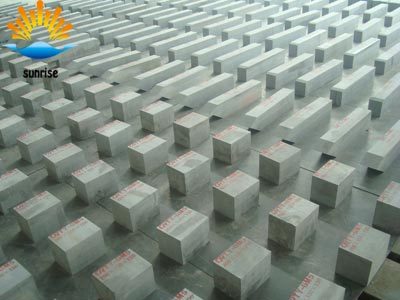The difference between refractory bricks and clay refractory bricks
2018-08-16
Clay refractory bricks are a type of refractory bricks, belonging to shaped refractory products, which are a series of refractory materials distinguished from the delivery form. Now the definition of refractory bricks has not only depended on whether the refractoriness is above 1580 °C. At present, refractory materials generally refer to inorganic non-metallic materials used in the lining of production equipment such as metallurgy, petrochemical, cement, ceramics, etc. The acid refractory material is mainly composed of silicon oxide (SiO2), and silicon bricks and clay bricks are commonly used. The clay brick is made of refractory clay or coke gypsum clinker. It contains 30%-46% alumina and has a refractoriness of 1580-1770 °C. It is a weakly acidic refractory material with good thermal shock resistance and corrosion resistance to acid slag. It is widely used. The clay brick is made of refractory clay as the main raw material. It is called ordinary clay brick. It is made of coke clinker as the main raw material. The clay brick with the porosity of 17% or less is called low-porosity clay brick. The two kinds of clay bricks are divided into several grades according to the physical and chemical indicators among them, and the price difference between ordinary clay bricks and low-porosity clay bricks is large. Neutral refractories are mainly composed of alumina, chrome oxide, silicon carbide or carbon.
Clay refractory brick refers to a clay product having an Al2O3 content of 30%-40% aluminum silicate material. The clay brick is made of 50% soft clay and 50% hard clay clinker, and is compounded according to a certain particle size requirement. After molding and drying, it is fired at a high temperature of 1300-1400 °C. The mineral composition of clay bricks is mainly kaolinite (Al2O3·2SiO2·2H2O) and 6%-7% impurities (oxides of potassium, sodium, calcium, titanium, iron). The firing process of clay bricks is mainly due to the continuous dehydration of kaolinite to form crystallization of mullite (3Al2O3·2SiO2). The SiO2 and Al2O3 in the clay brick form a eutectic low melting point silicate with impurities during the firing process, surrounding the mullite crystal.
Clay refractory bricks are weakly acidic refractory products, which are resistant to the attack of acid slag and acid gas, have poor resistance to alkaline substances, have good thermal properties, and are resistant to rapid cooling and rapid heat. Its refractoriness is comparable to that of silicon bricks, up to 1690-1730 ° C, but the load softening temperature is 200 ° C lower than the silica brick. Because clay bricks contain nearly half of the low-melting amorphous glass phase in addition to high-refractory mullite crystals. In the temperature range of 0-1000 ° C, the volume of the clay brick expands uniformly with the increase of temperature, the linear expansion curve approximates a straight line, the linear expansion ratio is 0.6%-0.7%, and only about half of the silicon brick. When the temperature rises to 1200 ° C and then continue to heat up, its volume will start to shrink by the maximum expansion. The residual shrinkage of the clay bricks causes the cracks in the masonry crevices, which is a major drawback of clay bricks. When the temperature exceeds 1200 ° C, the low melting point in the clay brick gradually melts, and the particles are closely pressed against each other due to the surface tension, thereby causing volume shrinkage. Due to the low softening temperature of the clay refractory brick, it shrinks at high temperature, the thermal conductivity is 15%-20% smaller than that of the silica brick, and the mechanical strength is also worse than that of the silica brick. Therefore, the clay brick can only be used in the secondary part of the coke oven. Such as regenerator wall sealing, small flue lining brick and regenerator grid brick, furnace door lining brick, furnace top and riser lining brick.

